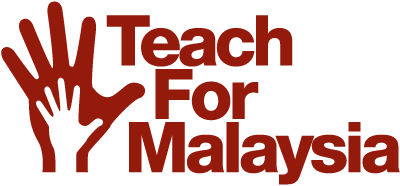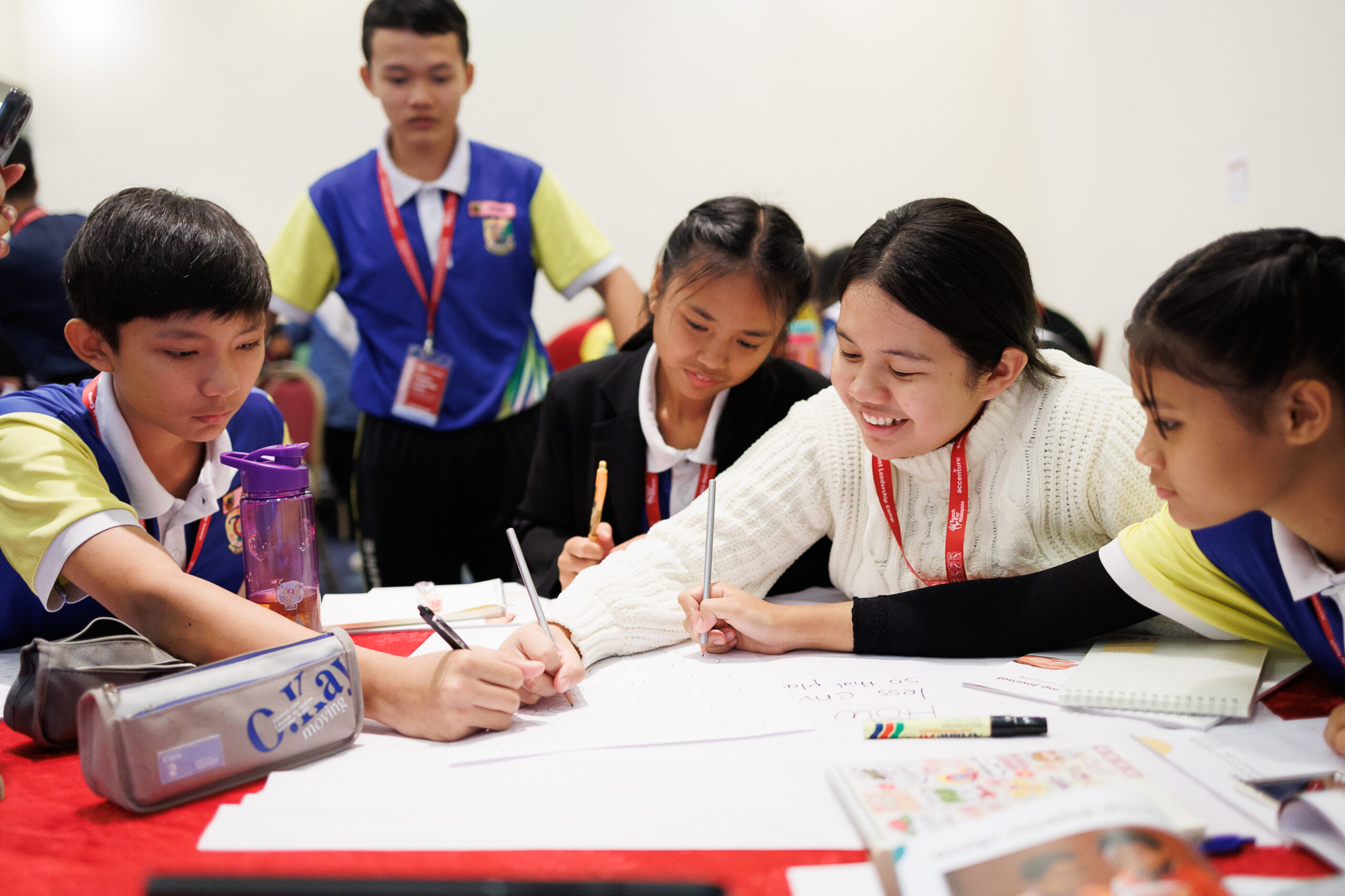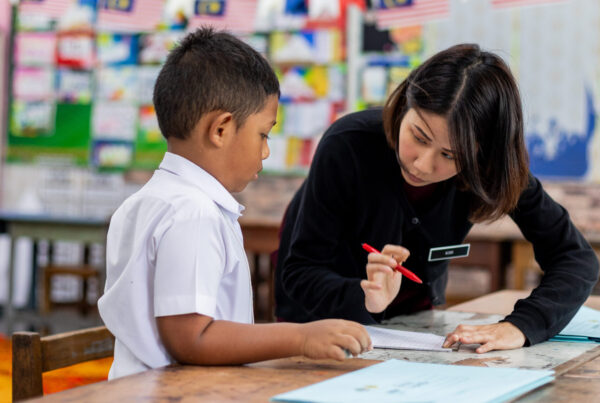Navigate Our Article
- Building Tomorrow’s Leaders: Our Student Leadership Development Framework
- Unleashing Student Potential: What We’ve Observed
- Growing Together: How We’ve Evolved
- Broadening Our Approach: Mobilising The Community
- Voices from the Community: What We’ve Heard
- Strengthening Our Tools: Commitment to Continuous Improvement
- Evaluating Programme Impact: Insights from Research
- Building Strong Relationships: The Impact of Student-Adult Partnerships
- Student Voices: Reflections from our Student Leaders
- Conclusion
A child’s background should not determine their life outcomes and at Teach For Malaysia, we aim to develop ground-up leadership in high-need communities for sustainable change. The past years have shown us that we must foster leadership at every level, from the classroom to the highest levels of leadership to achieve education equity. Only through collective leadership will we be able to achieve system transformation.
As we envision a future where all students in Malaysia are empowered to be leaders of their own learning, their future and the future of Malaysia, our student leadership programmes are geared towards increasing the number of young changemakers across the country who are driving locally-led community solutions and are empowered to pursue their desired career pathways.
Our longest-running student leadership programme, the Student Leadership Camp (SLC) was launched in 2013 to provide a platform to develop leadership capacity and critical thinking skills amongst students from underprivileged backgrounds. SLC empowers students to develop local initiatives that would create a lasting impact in their schools and communities.
As we reflect on our journey, here are some key developments and lessons learnt over the years.
Building Tomorrow’s Leaders: Our Student Leadership Development Framework
Our Student Leadership Development Framework, known as the SCoRE framework, aligns with the leadership dimensions identified in the Malaysian Education Blueprint, focusing on socio-emotional learning, communication, resilience and entrepreneurship skills. To flesh it out further, we mapped the competencies onto the three domains in our Theory of Leadership: Lead Self, Lead Others, and Lead Change.
We also conducted a series of student dialogues to review the framework, providing us with deeper insights. This process gave us a structured pathway for developing student leaders. Given the fast-paced, ever-evolving education landscape, we are committed to continuously reviewing the framework to ensure it remains relevant and effective in fostering student leadership.
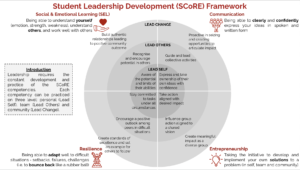
Teach For Malaysia’s SCoRE framework.
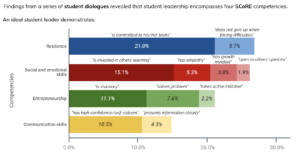
Findings from the student dialogues.
Unleashing Student Potential: What We’ve Observed
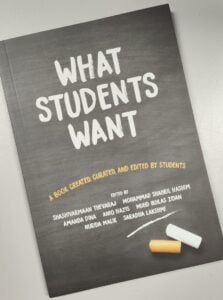
What Students Want – A Book Created, Curated, And Edited By Students.
When students are given the opportunity, support, and trust, remarkable transformations occur as they are empowered to step out of their comfort zones and take action. In 2018, we supported our student leaders to publish What Students Want, a book featuring essays, stories, and artwork from students across Malaysia sharing their perspectives on education and how it can be reimagined. Shashi, the editor-in-chief of the student editorial team, was 18 years old at the time and shared about his leadership journey at an international Teach For All conference. To hear Shashi speak, click sini.
We have also seen students in our Student Leadership Camp (SLC) go from being nervous about speaking in front of a classroom to confidently pitching their projects to a large crowd. To further amplify student voices, we piloted a Student Council and our first Student Summit in 2023, enabling around a hundred students to come together and discuss issues they face in education, empowering them to contribute to meaningful dialogues.
The We Think Digital programme saw students running online campaigns to educate their peers and communities about digital issues, showcasing their ability to influence positive change. Through these initiatives, students have learned that their voices and actions matter. By holding students to high expectations, while providing the necessary support and motivation, we have also seen mindsets about their abilities and potential shift.
Growing Together: How We’ve Evolved
Our journey has not been without challenges. As we started working with new communities, there was a lot of learning and unlearning to do. However, each stumbling block provided us with an opportunity to strengthen our commitment to fostering student leadership in a meaningful and effective way.
Over the years, our programmes have evolved based on need, observations, feedback, and deep reflection. For example, we set out to make the Student Leadership Camp (SLC) more accessible and inclusive by translating our modules and resources, previously available only in English, into Malay. Students were also given the choice to pitch their projects in either language. This ensures that more diverse students can fully participate in our programmes. In 2022, as we expanded our reach, we adapted and contextualised our content and tools to better serve the younger students and Orang Asli students that we work with.
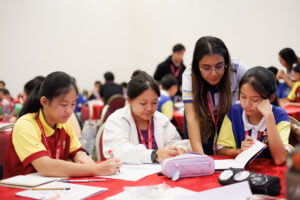
Student Leadership Camp 2024
We also found that involving students in our planning process helps make our programmes more engaging and relevant. In addition, we started engaging with student leaders beyond our programme duration for greater and longer-lasting impact.
Broadening Our Approach: Mobilising The Community
We realised that fostering effective student leadership requires a collaborative approach involving parents, teachers, community leaders, and volunteers. Hence, we must also engage and empower others to create enabling conditions, mindset and behaviour changes to drive student leadership and development. This is aligned with the direction outlined in the Malaysian Education Blueprint, which emphasises the need to transition from “school learning” to “system learning.”
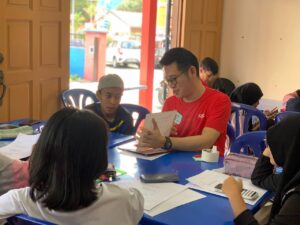
Program Komuniti Perkasa
By adopting a systems thinking mindset, we are working towards creating a positive and lasting impact on the students and the community. For example, Program Komuniti Perkasa (PKP) is one of the initiatives we run in PPR communities in Klang Valley where we encourage parents to attend the workshops alongside their children, deepening the impact and sustainability of our initiatives. To further our reach and impact, we have also made our student leadership modules available online, so that more students nationwide have access to resources to develop their leadership skills at their own pace. Click sini for the English modules and sini for the Malay modules.
Voices from the Community: What We’ve Heard
We’ve been encouraged by the positive feedback from the communities we serve and our partners. Teachers and volunteers have found our toolkits and training valuable for supporting their students. Parents have reported notable improvements in their children’s behaviour, including increased responsibility at home and greater motivation in their studies. This has contributed to shifting the mindset among teachers and parents to value student empowerment and leadership, recognizing the importance of holistic development beyond a sole focus on academics.
Students have embraced the idea that everyone can be a leader, showing growth and commitment to this belief by transforming themselves and those around them. Meanwhile, our partners have become more energised and responsive to the issues raised by the students, inspired by the valuable contributions and impact that these young changemakers can make when given the platform and opportunity. With the support of diverse stakeholders, we can enrich our approach and amplify our impact.
Strengthening Our Tools: Commitment to Continuous Improvement
As we scale, we recognise the need to review and enhance our student leadership framework and tools. In 2023, we commissioned a validation study on our SCoRE survey, a key reflection and assessment tool to evaluate student leadership growth and programme effectiveness. We have thus revised the survey based on the recommendations of the research team from Universiti Teknologi Malaysia (UTM) such as introducing statements with varied difficulty levels, restoration of a 5-point scale, removal of double-barreled items, and back-to-back English and Bahasa Melayu translations for consistency. These revisions ensure that our tools remain effective, supporting our commitment to continuous improvement.
Evaluating Programme Impact: Insights from Research
In the same research by UTM, the impact of our programmes was also studied to assess their effectiveness in cultivating student leadership development. By analysing feedback from various stakeholders, including students and TFM Fellows, the research provided valuable insights into the strengths and areas for improvement for our programmes.
External assessments by experts help us refine our strategies, ensuring that our programmes are not only engaging but also aligned with our commitment to fostering positive, sustainable change in student leadership and development. We are keen to conduct more evaluations like this to leverage key learnings to deepen our impact.
Building Strong Relationships: The Impact of Student-Adult Partnerships
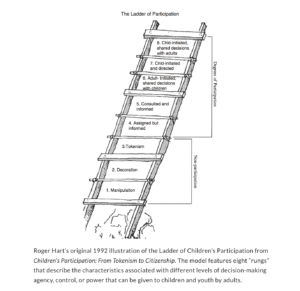
While we’ve always believed in the importance of building relationships with students, the same study offered compelling evidence of the positive effects of student-adult interactions that are based on trust, empowerment, and cooperation. Focus groups with SLC students revealed that they deeply value their engagement with our Fellows, who guide them through various aspects of the programme. Students felt heard and appreciated the Fellows’ ability to model positive behaviour and provide motivation.
This significantly enhanced students’ confidence, bravery, and teamwork skills, helping them navigate challenges and grow. Hence, student-adult interactions can greatly impact student experiences and achievements.
Aligned with Roger Hart’s Ladder of Participation, our vision is to see students reach Rung 8, where they engage in shared decision-making with adults. For this to happen, we need to create conditions where students are able to act on issues they identify and actively participate in decision-making processes. While not every student may operate at this highest level, we are committed to maximising opportunities for all children to participate at their highest potential by equipping students with the skills, mindset, and opportunities necessary for effective shared decision-making and ongoing collaboration with adults.
Student Voices: Reflections from our Student Leaders
As we continue to learn and enhance our programmes to increase student impact, we are inspired by the reflections of our student leaders.
“The kind of leader I want to be when I grow up is a leader that has empathy, empathy to others and empathy to myself too.” Cassandra, SLC 2023.
“After I joined SLC, I’m more confident and I like to speak in public.” Ruthiana, SLC 2023.
“If I did not join WTD, I don’t think I would be speaking like this. I have the skills, but I just need the space [and opportunity] to express them.” Mazira, WTD 2020.
Debbie, participated in SLC in 2021 and became the head prefect in her school. She wants other students to have the same opportunities as her so that they can grow their leadership skills. “It has led me to find my own voice and stand up for what is right.”
Hear from more student leaders in this video.
Conclusion
Our decade-long journey in developing student leaders has reaffirmed our belief that every child has the potential to be a leader, regardless of their background. As we look to the future, we remain focused on efforts to empower students to lead and drive change in Malaysia.
By creating enabling conditions for meaningful participation and decision-making, and by engaging with diverse stakeholders, we aim to sustain and amplify our impact. We are excited to continue championing student leadership.
When we keep students at the centre and invest in their development, we not only unlock their potential but also pave the way for a more equitable and inclusive future for all.
